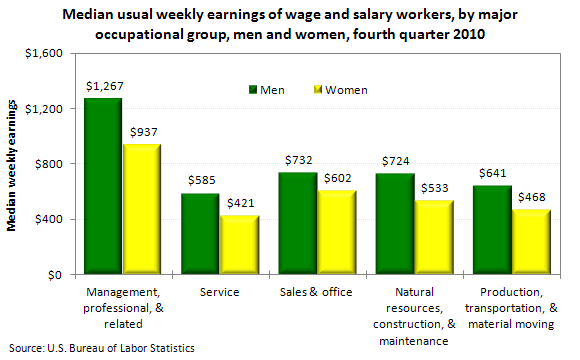It’s surprising to think that women still earn less pay in the work force than men do, especially women of color. And i never really knew exactly why it is this way, or what caused it to be this way.

As industrialization moved production out of the home in the late nineteenth and early twentieth century’s, the public sphere of production and private of home became sectioned into two groups: Men, for the public domain as bread winners, and women for private as the spiritual back bone of the family. This defined womanhood primarily in terms of wifehood and motherhood. Social customs reflected these attitudes. Thus, women received lower wages than men because the “Cult of Domesticity” threw female employment into disfavor and because it was assumed that women worked only to supplement the earnings of the male bread winner.
This is even true for the woman who is just as qualified as her male counterpart, if not more qualified. More often than not because of the cult of domesticity or society in general the woman will earn lower pay. One of the ways I’ve actually seen this is in my own house hold, both my parents have the same occupation and qualification, despite of this my mom earns less pay and works harder to bring that home. She then comes home and does work at home.
Interestingly enough, most middle class women did not challenge the gender based-based division of labor or the enlargement of the responsibilities in the domestic sphere. Nineteenth century middle-class white women helped to elaborate and refine, rather than overthrow the domestic code. Instead of questioning the inequitable gender division of labor, white middle-class women delegated the more onerous household tasks onto women of color. Essentially, rather than confronting the gender separation full on they just decided to modify the code to cause a separation in ethnicity. I mean it makes sense, rather than risking your job just pigeon whole the shitty jobs on the scape goat. That way the white middle-class woman does not get affected by this. This shows the cause of female job ghettos in its basic form, it also shows that it is in the material interest of white women to keep colored women subordinate to them in the work place.
Women of color have faced and continue to face special forms of exploitation as workers. Many women in the work force are stuck in jobs as assistants, temps, secretaries; nurses etc. “Lower paying jobs.” This in turn forces them to work multiple jobs to make up for the crappy pay they get from those jobs. After that they are expected to come home and take care of the family.
I had an internship over this last summer and I was the assistant of an assistant, as dumb and easy as that sounds the tasks I was given were very demanding. Anyways, I was an assistant to a black woman, and she was considered a temp. When I started I was making eight dollars an hour “minimum wage”, which coincidentally was the exact same pay she was earning. When I found this out I was kind of surprised, not only was I less qualified than her, her job was much more intensive, and she had been there for two years already. So how was she not earning more than me? To make things even worse, she worked another job as an assistant, took night classes at LAVC and still had to go home and take care of her family. I asked her how much sleep she got in a given day and her average was around three hours of sleep every night. Which I could tell was taking a toll on her. She looked so tired when she came in for work.
The fact of the matter is that these women of color are being overworked and underpaid; I think the only way to change this is for more than this particular group speaking up. However doing that would jeopardize the jobs of the people who don’t experience this problem.




